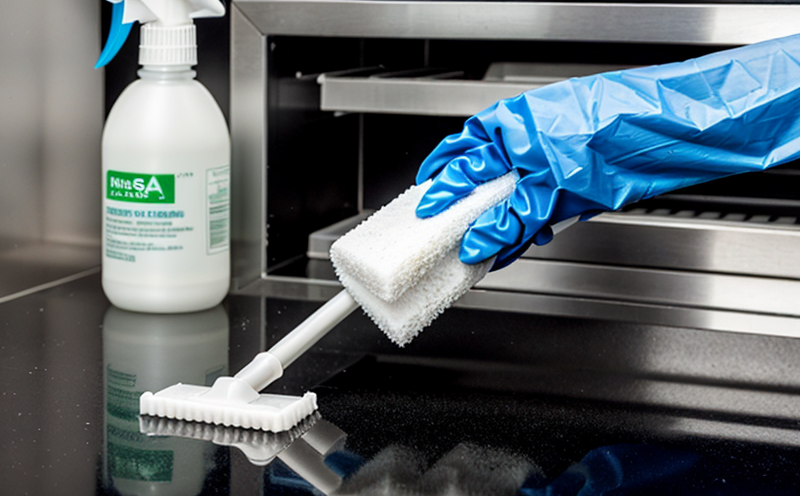ISO 21530 Hygiene Plastics Stability Testing
The ISO 21530 standard is pivotal in ensuring that hygiene plastics remain safe and effective over their intended lifetimes, particularly in environments where microbial contamination could pose significant risks. This testing protocol evaluates the stability of plastic materials used in products such as medical devices, food contact surfaces, and personal care items. The primary objective is to assess whether these materials maintain their chemical integrity and do not release harmful substances that could compromise hygiene standards.
The testing process involves exposing the plastics to controlled conditions designed to simulate real-world environments where microbial growth might occur. These conditions include temperature, humidity, and the presence of specific microorganisms. The standard specifies that exposure should be conducted in a manner that reflects actual usage scenarios, ensuring that the results are relevant and applicable.
A critical aspect of ISO 21530 testing is the evaluation of leachables and extractables. Leachables refer to substances that can migrate from the plastic into contact with food or medical products, while extractables are those that could potentially come in contact with consumers during use. This dual assessment ensures that the plastics do not introduce contaminants that could affect hygiene or lead to adverse health effects.
The testing parameters include detailed protocols for specimen preparation and exposure conditions. Specimens must be prepared according to precise dimensions and specifications outlined in the standard, ensuring consistency across different laboratories. Once prepared, these specimens are subjected to specified environmental conditions for a defined period, after which they undergo thorough analysis using sophisticated analytical techniques.
The acceptance criteria for ISO 21530 testing are stringent and designed to protect public health. Specimens must meet strict limits on the release of leachables and extractables to ensure that they remain safe under all expected use conditions. This includes not only chemical purity but also structural integrity, ensuring that the plastic materials do not degrade or break down in ways that could lead to contamination.
The importance of this testing cannot be overstated, especially in sectors where hygiene is paramount. By adhering to ISO 21530 standards, manufacturers can ensure that their products meet the highest safety and quality standards, thereby protecting public health and maintaining consumer trust.
Why It Matters
The significance of ISO 21530 hygiene plastics stability testing extends beyond mere compliance with international regulations. This testing is crucial for ensuring that products meet the stringent requirements set by regulatory bodies worldwide. By adhering to these standards, manufacturers can demonstrate their commitment to quality and safety, which is essential in maintaining consumer trust.
In sectors such as healthcare, food processing, and personal care, where hygiene is critical, ensuring compliance with ISO 21530 helps mitigate the risk of microbial contamination and chemical leaching. This not only enhances product safety but also protects against potential legal and reputational risks associated with non-compliance.
The testing process itself plays a vital role in identifying any issues that could arise during the lifecycle of the product. By conducting this type of stability testing, manufacturers can identify potential weaknesses or vulnerabilities early on, allowing for timely corrective actions. This proactive approach helps maintain the integrity and reliability of products throughout their intended use.
Moreover, ISO 21530 testing supports continuous improvement within organizations by providing valuable insights into product performance under various conditions. This data-driven approach enables companies to refine their manufacturing processes and improve product design, ultimately leading to better-performing and more reliable products.
Benefits
The benefits of ISO 21530 hygiene plastics stability testing are numerous and far-reaching. Primarily, it ensures that the plastic materials used in hygiene-related products remain safe and effective over their intended lifetimes. This is achieved through rigorous testing protocols designed to evaluate both chemical integrity and structural stability.
- Enhanced Product Safety: By adhering to ISO 21530 standards, manufacturers can ensure that their products do not release harmful substances into contact with food or medical devices, thereby protecting public health.
- Regulatory Compliance: Meeting these international standards demonstrates a company's commitment to regulatory compliance, which is essential for avoiding costly legal and reputational risks.
- Improved Consumer Trust: Consumers are increasingly concerned about the safety of hygiene products. By passing ISO 21530 testing, manufacturers can build trust and foster customer loyalty.
- Enhanced Product Integrity: The testing process identifies potential weaknesses or vulnerabilities early on, allowing for timely corrective actions that maintain product integrity throughout its lifecycle.
- Data-Driven Decision Making: ISO 21530 testing provides valuable insights into product performance under various conditions. This data-driven approach enables companies to refine their manufacturing processes and improve product design.
In summary, the benefits of ISO 21530 hygiene plastics stability testing extend far beyond mere compliance with international regulations. It ensures enhanced product safety, regulatory compliance, improved consumer trust, enhanced product integrity, and data-driven decision making. These advantages collectively contribute to a safer, more reliable, and trusted product ecosystem.
Environmental and Sustainability Contributions
- Eco-friendly Materials: ISO 21530 testing helps identify eco-friendly materials that can be used in hygiene plastics without compromising safety or performance. This supports the development of sustainable products that minimize environmental impact.
- Reduced Waste: By ensuring that hygiene plastics remain stable and effective over their intended lifetimes, ISO 21530 testing helps reduce waste associated with product failures due to microbial contamination or chemical leaching.
- Sustained Use: The stability of the plastic materials ensures they are used to their full potential, minimizing unnecessary replacements and extending the lifecycle of products. This contributes to a more sustainable use of resources.
- Energy Efficiency: By ensuring that hygiene plastics remain effective over time without degrading or breaking down, ISO 21530 testing helps reduce energy consumption in manufacturing processes, contributing to overall sustainability efforts.
The environmental and sustainability contributions of ISO 21530 hygiene plastics stability testing are significant. By supporting the use of eco-friendly materials, reducing waste, sustaining product use, and promoting energy efficiency, this standard plays a crucial role in advancing sustainable practices within the industry.





